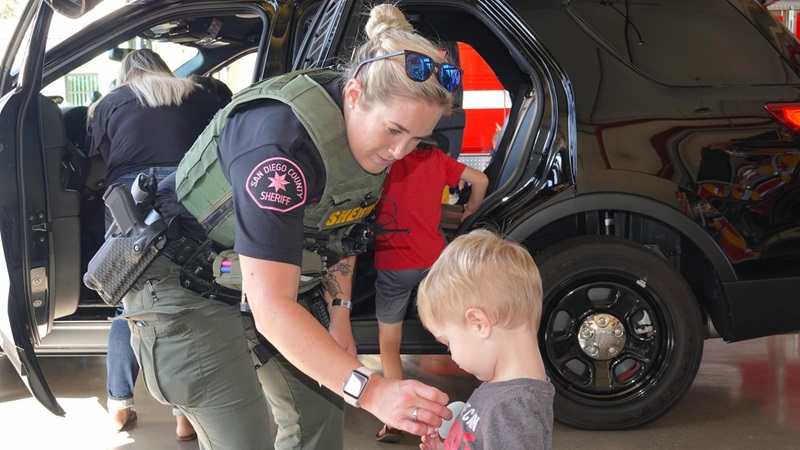
Modern law enforcement has a crucial role in society: ensuring public safety, upholding laws, and fostering trust between communities and the criminal justice system. At its core, law enforcement is not just about enforcing regulations; it’s about protecting lives, preserving justice, and building partnerships that strengthen the social fabric.
In this article, we’ll delve deeper into the intricacies of modern law enforcement and explore ways to learn more about this vital field.
Eager to dive in? Explore our free comprehensive homeschool course designed to educate individuals on the realities and challenges of policing in today’s world.
Modern Law Enforcement: An Overview
Criminal Justice: The Backbone of Public Safety
The criminal justice system is the foundation upon which modern law enforcement operates. It is a multi-faceted structure comprising three main components:
- Law enforcement agencies: These include police departments, sheriffs’ offices, and federal agencies like the FBI and DEA. Their primary responsibilities are crime prevention, investigation, and apprehension of offenders.
- The judicial system: Courts ensure justice by interpreting and applying the law, conducting fair trials, and determining appropriate penalties.
- Corrections: This includes prisons, probation, and parole systems that focus on rehabilitating offenders and ensuring public safety.
Together, these elements work in tandem to deliver justice, prevent crime, and maintain societal order. Law enforcement officers serve as the first point of contact within this system, bridging the gap between the community and the judicial process.
Criminal Law: The Rulebook for Society
Criminal law defines the legal parameters within which law enforcement operates. It outlines what constitutes a crime and sets forth punishments for those who break the law. This framework ensures that law enforcement actions are conducted fairly and consistently while protecting citizens’ rights.
Modern law enforcement officers must have a strong understanding of criminal law to perform their duties effectively. From interpreting probable cause to ensuring lawful arrests and searches, their work demands a careful balance between enforcing regulations and respecting constitutional rights.
Community-Police Relations: Building Trust and Collaboration
Strong relationships between law enforcement and the communities they serve are critical to effective policing. Historically, strained relations have led to mistrust and, in some cases, escalated tensions. Modern policing strategies increasingly emphasize transparency, accountability, and community engagement to address these challenges.
Some of the most successful community-police initiatives include:
- Community policing: Officers work closely with residents to identify and address local safety concerns.
- Youth outreach programs: These initiatives aim to build trust with younger generations through mentorship and education.
- Diversity training: Ensures officers are equipped to serve diverse communities respectfully and effectively.
Building trust isn’t just about reducing crime — it’s about creating a sense of shared responsibility for public safety.
How to Learn More About Modern Law Enforcement
If you’re looking to deepen your understanding of modern law enforcement, a structured learning approach can be invaluable. One such resource is our free homeschool course, “Defending Law Enforcement and Restoring Criminal Justice.”
This course is designed for homeschool educators, students, and anyone interested in gaining a balanced perspective on the challenges and contributions of law enforcement. The course covers key topics such as:
- The role of law enforcement: Examining the responsibilities and expectations placed on officers.
- Challenges in policing: Exploring issues like officer safety, public perception, and resource limitations.
- Restoring criminal justice: Highlighting the need for fair and effective policies that support both justice and law enforcement efforts.
Why Choose This Course?
The course offers a unique opportunity to:
- Gain insight into the real-world experiences of law enforcement officers.
- Learn about the critical role police play in maintaining societal order.
- Understand how to support and advocate for reforms that strengthen the criminal justice system.
By engaging with this course, participants can develop a well-rounded view of law enforcement and its importance in society.
The National Police Association (NPA) is a nonprofit organization dedicated to supporting law enforcement agencies and officers. Through education, advocacy, and outreach, we work to strengthen public support for police and address misconceptions about law enforcement.
The NPA offers various resources, including eBooks, courses, and community programs, to help individuals and organizations better understand and engage with modern policing. By supporting the NPA, you’re contributing to efforts that foster safer communities and a stronger criminal justice system. Get your free download of our course today, or donate to help advance public safety, strengthen community trust, and support the protection and service of the American people.






